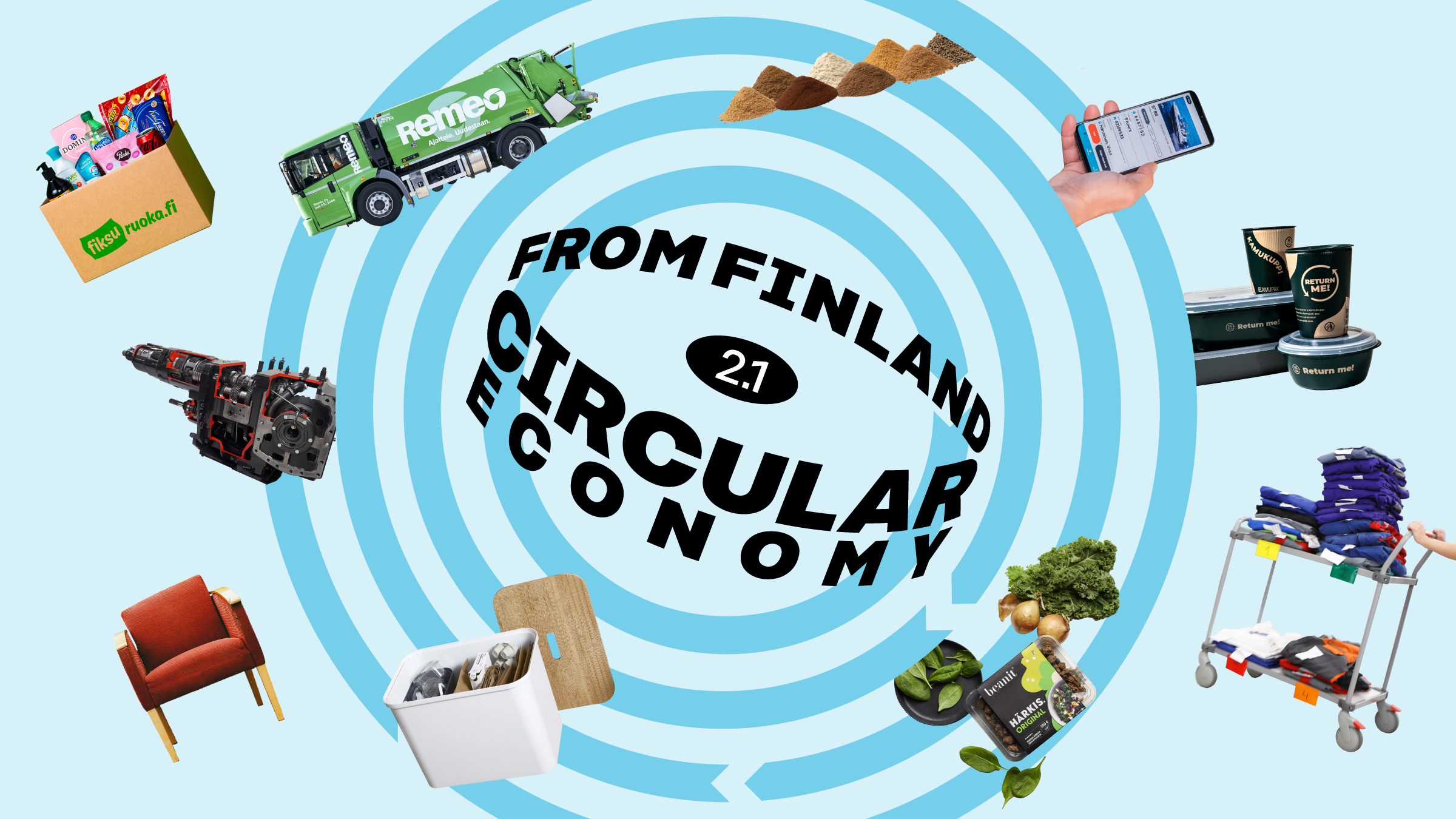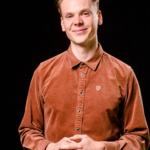Sitra has updated a tremendously popular “The most interesting companies in the circular economy” list since 2017. During this time, circularity has gone from being a niche initiative from a selection of individual pioneering companies to being a widespread profitable business phenomenon.
The new “The most interesting companies in the circular economy in Finland 2.1” list presents 41 pioneering companies that offer circular economy The circular economy An economic model which does not focus on producing more and more goods, but in which consumption is based on using services – sharing, renting and recycling – instead of owning. Materials are not destroyed in the end, but are used to make new products over and over again. Open term page The circular economy solutions to the global sustainability crisis.
A total of 168 companies applied to be included in the directory and a jury comprised of circular economy specialists from Sitra and its partners chose the 41 most interesting applicants. The selected companies represent various industries and the five business models of the circular economy.
Take a closer look!
3stepIT offers more than just the leasing of laptops
3stepIT provides IT devices to businesses and the public sector. The company helps customers find the right device, monitors its use and ultimately ensures the reuse of the device once the customer no longer needs it.
Up to 98 per cent of devices returned to 3stepIT will end up with a new owner after our processing, and the remaining 2 per cent will be recycled and recovered as raw material. The business model ensures a high usage rate of devices which means less need to manufacture new ones.
Combi Works takes advantage of factories’ surplus capacity
Combi Works offers factory production as a service to companies. However, it does not own a single factory itself but uses the surplus capacity of other factories for production. the company finds the most suitable and cost-effective solutions for them and manage and optimise the production chains.
In a circular economy, existing resources – such as the production capacity of factories – are used effectively instead of building new ones.
Lindström provides workwear as a service, letting customers focus on their core business
In a traditional linear operating model, companies manufacture and sell their products. Lindström instead provides companies with the textiles they need and look after the entire life cycle of the products, from design to reuse. After use the recovered textiles are recycled to new workwear.
Lindström designs and manufactures textiles only for the companies’ needs and make them as durable as possible. This way the company can reduce overconsumption and save natural resources.
Whim gathers all modes of transport into one package
Whim is an application that provides freedom of movement without the trouble of ownership. With one monthly fee, users can access all means of transport, from trains to shared cars and from taxis to scooters.
For example, Helsinki is full of cars that sit unused, waiting for the owner’s next trip to the summer house. With Whim, the existing transport resources are used wisely and driving is replaced by other modes of transport, which reduces emissions.
Tamturbo offers compressed air as a service
All factories need compressed air to transmit power. However, the production of compressed air consumes up to five per cent of the electricity in the world. Tamturbo manufactures turbo compressors and sells the compressed air produced by them to factories with a monthly fee.
In compressed air as a service, the customer pays only for the compressed air it uses and Tamturbo owns the compressor producing it in the factory. The customer saves money and we are responsible for the durability and quality of the equipment.
Vaatepuu makes sure that you do not need to own everything that is beautiful
Vaatepuu is a provider of services in sustainable clothing. In addition to a clothes library, their stores also offer other services, such as clothes recycling, and the repair and alteration services
Shared use tests the durability of an item of clothing. This information is important for designers so they can design clothes that last.
Valtavalo fights the throw-away culture with lighting solutions based on a replaceable light source
Valtavalo offers energy-efficient lighting based on replaceable light sources to companies and public administrations. The customer not only saves on lighting costs but also significantly reduces their carbon footprint.
In addition to saving energy, the company also want to avoid unnecessary consumption of materials. The replaceability of the light source makes it possible to reuse the lighting unit for many more years.
Emmy makes sure that high-quality clothes are used as long as possible
Emmy is an online shop for recycled clothing. The company checks and photographs the clothes and adds them to the online shop where consumers can buy them. The company also makes sure that clothes that are not sold are used by donating them to charity.
A longer lifespan of garments saves natural resources and cut emissions. Emmy has helped to reduce carbon dioxide emissions by 664 tonnes and saved more than 1,300 million litres of clean fresh water.
Fiksuruoka brings surplus food to people’s doorsteps
Food waste is a huge problem in society. According to the Natural Resources Institute of Finland (LUKE), one third of the global carbon dioxide emissions are caused by food production. In Finland, up to 15 per cent of all food goes to waste.
Fiksuruoka tackles the problem by buying surplus food from manufacturers and selling it online to consumers at affordable prices. The company promotes the circular economy by making sure that products whose manufacture burdens the climate and the environment do not end up as waste.
ResQ Club redeems surplus food from restaurants and brings it to consumer’s plates
ResQ Club is a digital marketplace for surplus food, enabling people to buy surplus food from restaurants, cafés and grocery shops at a reduced price.
Food industry operators can significantly reduce waste with the application. Consumers get high-quality food at an affordable price and easily, without having to spend time waiting. The restaurants can use consumer data collected by ResQ Club to improve their operation and cut the amount of food waste.
Skipperi makes sure that boats are not left sitting in the harbour and no one who wants to go boating needs to buy one
Owning a boat is expensive and the usage rate of boats is often low. Skipperi is a sharing platform that lets the customer rent a boat conveniently from the owner or get to be a skipper whenever you want, with a monthly fee.
Our service makes experiences available to many. At best, shared use of boats also reduces the need to keep on manufacturing more and more new boats.
Tori.fi helps Finnish people consume in a responsible manner
Tori.fi is the largest marketplace for second-hand goods in Finland. Its entire operation is based on the circular economy. Tori has played a major role in making buying second-hand goods easy, popular and attractive in Finland.
Last year, Finnish people saved 195,000 tonnes of carbon dioxide emissions through consumer-to-consumer sales on Tori.fi compared to buying new products.
Ecolan recovers ash from power plants
Ecolan produces fertilisers and construction materials from ash generated in the burning of biomass, coal or peat in the energy industry. The solution restores nutrients to forest soil, for example.
Each kilogram of fertiliser applied to forests also increases the carbon dioxide sequestration capacity of the forests, and this also ensures that forest owners can gain economic benefits.
EcoUp helps the construction sector in the green transition
The construction industry has ambitious climate goals and there is demand for more ecological products
EcoUp is a circular economy group that manufactures carbon-neutral thermal insulation and reuses the side streams from construction. For the company, a demolished building is a treasure trove from which we can recover several different raw materials. For example thermal insulation captured from demolished buildings can be used as a raw-material for new products.
Infinited Fiber’s technology allows wasted textiles to be reborn
The company sells the technology licence for our patented Infinna manufacturing process to fibre producers. In other words, it offers fibre manufacturers a way to expand their product portfolio by adding the regenerated Infinna fibre to their product range.
Kotkamills encourages the Finnish forestry sector to advance quicker towards circularity
Today, the operations of MM Kotkamills, a traditional forest industry company, are based on the circular economy. The company makes paper from the sawdust generated by our own sawmill and other nearby sawmills and use the wood chip side stream of the sawmill in the manufacture of paperboard.
The company produces paperboard with barrier properties, which means that the material is resistant to liquids and grease, for example. The board is easily recyclable and can replace plastics in packaging. Consumers can see the paperboard in the paper cups used in the Lavazza coffee vending machines.
Neste’s next step involves making plastic out of algae and landfill waste
Last year, Neste’s renewable fuel produced from waste and residue cut CO2 emissions by 10 million tonnes. Now, the company is looking to use landfill waste or algae as raw materials for fuel and plastic.
Liquefied waste and residues are collected from various partners. In a pilot project with the City of Oakland in California, Neste recovered frying fats used in the city’s cafeterias and delivered them back to the city as fuel to be used in the city’s vehicles, including street sweepers and garbage trucks.
Paptic wants to replace plastic in packaging with its recyclable materials
Material innovation developed by Paptic is used to replace plastic in packaging. The material is based on softwood pulp. It is as strong as plastic but as easy to recycle as paper. Existing paper making machines can be used to make the material.
Consumers can use durable Paptic bags dozens of times and finally recycle them as paper waste.
Soilfood processes fertilisers from industrial side streams
Soilfood makes fertilisers and soil improvers for agriculture from industrial side streams. The nutrients processed from the side streams also bind carbon to soil.
Side streams from approximately 50 factories are processed into soil improvement fibres that it sells on to farmers. The fibres bind carbon, disintegrate slowly, improve the growing condition of the field and improve the harvest. The carbon sinks created by using soil improvement fibres are verified by a neutral party and sold to another company for the compensation of emissions.
Spinnova’s textile fibre made from pulp and leather waste solves environmental problems in the textile industry
In addition to paper pulp and waste leather, the company can produce textile fibre from agricultural waste such as wheat and barley straw. In the future, new fibre can be made from recycled textiles, such as used cotton garments.
Verso Food, a company acquired by Raisio, brings fava beans to our plates
The Beanit and Härkis products made of fava beans have been a hit with Finns. The products come with relatively low emissions and the process is efficient, as the aim is to grow food that can go directly to people instead of first growing feed for livestock, for instance.
Verso Food also promotes the circular economy in other ways. For instance, fava bean pods, which are left over from food manufacturing, have been used as plant litter in gardens. Even fava bean mince, one of the main products, originates from production waste as some pieces were too small to be sold as fava bean chunks.
Woodly redesigned plastic
Changing over from plastic to Woodly’s material does not require new factories or new technology, the process merely runs on existing machines. The properties of recycled Woodly are excellent from textiles to composite. Recycled Woodly can also be used in different plastic films.
Kamupak is a circular takeaway packaging solution
Kamupak provides a circular solution that uses a digital deposit system to replace single-use packaging with reusable packaging. The solution aims to keep reusable packaging and other products in circulation. When When a packaging reaches the end of its life cycle, the material is recycled.
At the moment Kamupak is used by 50 restaurants, cafes and supermarkets selling takeaway food around Finland. There are plans to to expand the deposit system from takeaway food packaging to other categories.
Konecranes designs cranes that withstand time and use
The company is are able to modernise even machines dating back to the 1920s to suit modern standards. Products are often modular, which allows the use of existing components and replacement of only essential parts. Maintaining the life-cycle value of a device for as long as possible saves natural resources and reduces greenhouse gas emissions.
Vaatelaastari by Oikiat Design patches the trouser in just one moment
Textile waste and fast fashion are a huge global problem. According to studies, the maintenance of fabrics and extending their useful life are the best way to reduce the emissions of the textile industry
The Vaatelaastari Patch is a Finnish adhesive patch for textiles. It is an easy way to repair a piece of clothing quickly and without sewing or ironing. The aim is to extend the usable life of textiles and also reduce the emissions in the textile industry.
Ponsse recycles parts from expensive forest machinery
Ponsse is a long-established forest machine manufacturer making the actual machines, but it has had an exchange service for forest machines since the 80s: when a machine is sold, Ponsse also accepts the used machine to be reconditioned for the next customer. The aim is to extend the service life of forest machines by reconditioning machines and their spare parts so that they can be sold again.
The recycled parts were surprisingly useful during the past year when there were problems in getting new spare parts. Our warehouses were not empty as we were able to offer recycled parts to our customers.
Valtra reconditions the old gearboxes and extends the service life of tractors by up to 30 years
Reman is short for remanufacturing. If the gear system of the tractor is damaged, the owner can order a new gear system remanufactured from used parts.
Remanufacturing is a quick, cost-efficient and environmentally friendly way to service a tractor. Because the entire gearbox is replaced at the same time, our customer and maintenance personnel do not need to calculate what repairing individual parts will cost
Varusteleka buys used goods and puts them back on sale
Varusteleka has grown into Europe’s largest seller of surplus military clothing. But at this point, there is not much left to sell from what armies have in storage.
Partly in response to this problem, Varusteleka developed its own Kierto Circular economy system. Customers can return products they have purchased if these have been left largely unused for whatever reason. Depending on the condition of the products, the customer can get up to half of the purchase price back in credits that can be used to buy products from Varusteleka’s online shop and dealership.
Betolar replaces cement with a low-emission circular economy option
Betolar, a company replacing cement with industrial side streams, is taking one of the world’s most polluting industries in a more sustainable direction.
The company is currently replacing cement with binding agents made from side streams from the steel, mining, forestry and energy industries. Nearly anything can be used as a raw material, including ash, gypsum sediment or tailings
Half of Biolan’s Musta Multa garden soil is compost mixture
The circular economy has been at the heart of Biolan’s operation from the very beginning. For 40 years, Biolan has been processing by-products from agriculture and the forest industry for its products.
The company avoids using virgin natural resources in the production of growing mediums and fertilisers. For example, Musta Multa, a well-known product, has undergone huge changes. Less than half of the product now consists of virgin raw material.
Fortum Battery Solutions offers a solution to the problem of the depletion of metals used in batteries
The world is become increasingly electrified and the demand for batteries is growing. The coming years will see a shortage of metals used in electric car batteries, including lithium, nickel and manganese.
Fortum, known as an energy corporation, is now offering a by collecting batteries from industry that are at the end of their life cycle or abandoned from production, removing the metals from the batteries, processing them into high-quality raw materials, and returning these to battery manufacturing.
Gasum produces biogas from waste
Energy company Gasum, known for its natural gas, is the largest producer of biogas in Finland and Sweden and aims to continue to increase its biogas production in future.
Biogas is made by decomposing organic matters such as biowaste. The process generates biomethane, which can be used to replace fossil fuels. In addition to our own biogas production, the company offers a distribution system for the biogas produced by its partners. To increase the use of biogas, it must be easily available.
The business of Globe Hope was based on the circular economy before the term had even been invented
Globe Hope manufactures clothes and accessories from surplus and leftover textiles. The popularity of the products grows hand in hand with consumer awareness. The company uses materials such as safety belts from cars and surplus leather from leather factories.
Products are designed and priced for average consumers because the company wants to offer a responsible alternative for everyone.
Honkajoki makes full use of the side streams from the meat industry
Honkajoki manufactures raw material for biofuels and pet food from the side streams from slaughterhouses.The company receives approximately 75 per cent of all animal-based side streams in Finland.
By processing the animal-based side stream further, products with a high value can be made. Honkajoki’s circular economy solutions have huge growth potential in developing countries where the consumption of meat is increasing and the processing of the side streams is almost entirely lacking
Orthex manufactures plastic products from the plastic packaging collected from consumers
Orthex is a plastic product manufacturer familiar to all Finnish people. It makes buckets, baskets and flowerpots, nowadays also from plant-based and recycled materials. The company has for example made buckets from recycled fishing nets.
The company is intrigued by the opportunities of chemical recycling, which would create new ways to use recycled plastic. Recycled plastic products do not require virgin raw materials at all.
Pure Waste manufactures clothes, yarns and fabrics from 100% recycled material
Pure Waste takes the circular economy into account at every stage of our clothes production, from collecting the raw materials to when the customer returns the used clothing to us to be reused. Waste is reduced at every stage of the process, and the company uses raw materials that would otherwise end up burned or in landfills
The company wants to develop an ecosystem of responsible textile production, in which material and expertise are recycled in Finland.
Remeo increases the reuse of waste material generated by the construction industry and the retail sector
Environmental management company Remeo invested 35 million euros in a recycling plant that uses artificial intelligence to recycle waste from the construction industry and to reuse it much more efficiently than before.
If we want to be able to reuse the waste generated in the construction industry and retail trade, the material must be pure and of a high quality.
Rester wants to revolutionise the raw materials of textiles in industry
Rester is Finland’s first large-scale textile recycling plant. The recycling plant located in Paimio receives end-of-life textiles from companies such as laundries, companies producing workwear and from offcuts generated as side streams from industry.
Rester makes high-quality recycled fibre for industry from the end-of-life textiles. The textiles are used to make recycled fibre for the domestic textile and construction industry. Textiles are used in a wide variety of products, from clothes to furniture to air filters.
Durat aims at a fully closed loop for plastic furniture
Durat makes fully recyclable material for furniture from waste plastics and buys the used products back. The company aims to keep all of their products in circulation so that not a single item ends up as waste.
Products made from waste plastic will also be able to respond to future requirements, for example, when waste charges become stricter and the life cycle of products will be more closely monitored.
Touchpoint makes circular workwear
Touchpoint manufactures durable workwear from recycled material and looks after the entire life cycle of its products from design phase to manufacturing, takeback and recycling.
Reuse of materials is considered as early as the design stage. The best workwear to recycle is as simple as possible – the fewer blends and materials the product contains, the easier it is to recycle and use as new raw material.
ZenRobotics robots sort waste efficiently
ZenRobotics is the first company in the world to use artificial intelligence in waste sorting. The company manufactures robots that use AI and other recognition technologies to identify and sort waste fractions from household, industrial, and construction and demolition waste.
The solution we can significantly reduce the amount of raw material going to waste. Artificial intelligence makes the sorting more efficient and valuable materials can be better recovered from the waste stream.



